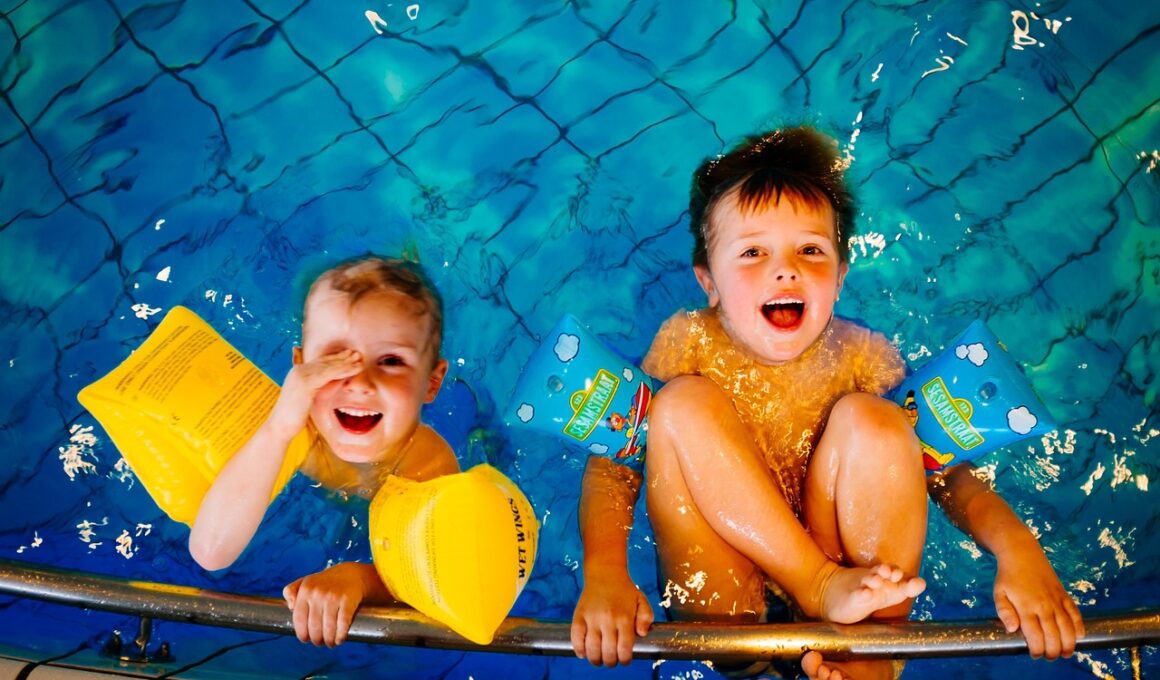The Benefits of Swimming for Youth Fitness and Confidence
Swimming emerges as a fantastic sport for youth, offering numerous benefits that promote fitness and overall well-being. This engaging activity provides a full-body workout, engaging almost every muscle group. Although swimming alone is beneficial, combining it with diverse water activities can enhance endurance and strength. As young swimmers practice, they not only improve their physical capabilities but also boost their cardiovascular health. Parents and guardians can contribute by scheduling regular swim sessions for children, making sure they enjoy the process. Access to pools can be a fun way to incorporate water play, and community clubs often introduce kids to swimming more competitively. Furthermore, by participating in swimming, youth build essential skills not only in terms of health but also in safety. Acquiring swimming prowess enables children to be safer around water. To increase participation, local schools can collaborate with aquatic centers to conduct swimming lessons. Such initiatives not only develop interest but also ensure children learn swimming basics, reinforcing the importance of safety in and around water.
When it comes to social interaction, swimming presents a unique platform for children and teens. Group swimming lessons encourage teamwork and cooperation, essential social skills in today’s world. Through activities with peers, kids can form friendships that extend beyond the pool, forging bonds through shared experiences and challenges. Moreover, swimming encourages healthy competition, especially when youth partake in swim meets or local competitions. These events stimulate motivation and push young athletes to improve their skills. Building connections with fellow swimmers instills community spirit and nurtures supportive relationships. Across various age groups, students can share tips and techniques, enriching each other’s learning journeys. Practical swimming experience fosters camaraderie among peers. Additionally, structured swim teams usually have practices that build discipline and accountability. Regular training sessions instill a sense of commitment and responsibility, preparing youth for future challenges academically and socially. Parents can play a pivotal role by supporting their child’s involvement in aquatic clubs. The encouragement can yield a lifelong appreciation for fitness and health while imparting resilience and emotional strength. Hence, swimming not only promotes fitness but also enhances vital life skills.
Physical Benefits of Swimming
Swimming serves as an effective exercise tool that promotes physical fitness. Engaging in regular swim sessions not only improves cardiovascular health but also develops muscular strength and flexibility. It is particularly appealing for youth since it is a low-impact sport, reducing the risk of injury compared to high-impact activities, like running. In addition to fostering strength, swimming also supports resistance and endurance training. Swimming laps builds stamina, helping children maintain energy through prolonged physical activities. Fitness levels rise naturally as young swimmers progress through various strokes. The water acts as a resistance source, enhancing muscle building without stressing the joints. Aquatic environments teach kids how to interact safely and confidently with their surroundings, promoting a sense of achievement tied to overcoming challenges. Kids develop a strong core and a better range of motion, contributing to improved athletic performance in other sports. Importantly, learning to swim instills a commitment to health and wellness throughout life. Swimming boosts lung capacity and lung function, yielding unique physical benefits that can profoundly impact athletes’ lives. Through structured practice, youth will discover their physical capabilities and improve performance not just in swimming, but across other activities.
Confidence often stems from achievement, and swimming is one sport that nurtures this trait effectively. As children master the techniques required to swim efficiently, they gain a deeper sense of accomplishment. Learning various strokes, such as freestyle and backstroke, provides a tangible measure of improvement over time. This continuous progress nurtures strength, resilience, and positivity, contributing to a robust self-esteem foundation. Children are naturally inclined to seek approval and recognition from peers, and accomplishing swimming milestones can fulfill this desire. Additionally, the supportive atmospheres of swim teams provide positive reinforcement, where coaches and teammates celebrate individual achievements. Parents can foster this growth by praising their child’s swimming efforts, regardless of competition performance. Not only does this positive reinforcement build confidence, but it also strengthens the parent-child bond. Self-discipline gained through regular swimming practice extends beyond the pool to academics and social scenarios, ultimately shaping a sense of confidence that influences personal interactions. As young athletes navigate through different challenges, their self-belief solidifies. Over time, these gains translate into enhanced self-image and aspiration to take on new challenges, whether inside or outside the water.
Life Skills Developed through Swimming
Aside from physical health, swimming equips kids with critical life skills that influence their character development. By engaging in this sport, youth learn time management and commitment through balancing practice schedules and academic responsibilities. Attending swim practices instills accountability, helping young athletes recognize the significance of putting effort into various aspects of life. This synchronization of various tasks fosters organizational skills which are important for academic success. Furthermore, swimming fosters independence. Youth learn to challenge themselves, embrace new experiences, and step beyond their comfort zones. This evolution nurtures resilience as they face challenges in mastering new techniques. Often, young swimmers encounter setbacks, whether it be performance dips or water anxiety, requiring perseverance to overcome these hurdles. As they navigate difficult situations, they learn how to adapt and bounce back stronger. Parents can facilitate this journey, ensuring opportunities arise for swim practices and competitions. Swimming promotes self-discipline—an instrument for success in any venture. Kids equipped with strong life skills will tend to navigate social pressures effectively, maintain their focus, and aspire towards their goals with confidence and determination.
Swimming also enhances mental health, providing an essential balance to youth’s busy lives. Engaging in physical exercise yields numerous psychological benefits, often alleviating stress and anxiety. The rhythmic nature of swimming can be meditative, fostering tranquility and mental clarity. Children immersed in water can experience peace, promoting emotional well-being. Regular participation provides an outlet for pent-up energy while offering joy through play and connection with peers. Encouraging children to take part in swimming fosters relaxation and enhances mood, allowing youth to process daily challenges more effectively. Mental resilience grows as kids encounter pressure during competitive swims, equipping them with the skills needed to handle real-life conflicts. Moreover, families can engage in swimming together, strengthening emotional bonds while sharing experiences in a healthy environment. It can spark conversations around developing healthy habits, reinforcing lifestyle choices focused on well-being. Creating structured family swim time cultivates discussions around self-care and emotional awareness, shaping socially responsible individuals. As youth find pleasure in swimming, they can develop a positive mindset towards exercise. This ultimately encourages a commitment to maintaining balanced mental health that lasts into their adolescent years.
Conclusion – Moving Towards a Healthier Future
The collective benefits of swimming illustrate its vital role in shaping a healthier future for youth. By focusing on both physical and mental fitness, swimming equips children with essential life skills, resilience, confidence, and social relationships. Engaging in this sport helps build a community of active young individuals who prioritize their health. Schools and organizations that advocate swimming foster environments that encourage physical activity, resilience, and emotional awareness among youth. Promoting swimming early in life can generate a deep-seated love for fitness that persists into adulthood. Therefore, it’s essential for communities to collaborate, ensuring that children have access to quality swimming programs that are engaging, educational, and equitable. Establishing regular swimming opportunities can not only enrich children’s lives but also strengthen community ties. Numerous studies highlight the significance of physical activity on overall well-being. Thus, encouraging consistent swimming practices can help combat rising issues like childhood obesity and mental health challenges. Through swimming, youth can discover not just the joys of fitness, but also develop deep-rooted habits that foster healthier lifestyles. Ultimately, with swimming, we can empower the next generation to embrace confidence and fitness.
By engaging in aquatic activities, youth can unlock vast potential, pushing boundaries and achieving greater physical, emotional, and social well-being. Swimming equips children with essential skills, nurturing characteristics and positivity that shape the trajectory of their lives. The rich benefits of participating in this rewarding sport extend beyond the pool, fostering connections and contributing to a healthier community overall. Parents, schools, and local organizations should recognize and promote this essential activity, ensuring youth reap the rewards of what swimming can offer. There is immense value in engaging with water as a sport that not only builds fitness but enriches lives and enhances personal growth.





